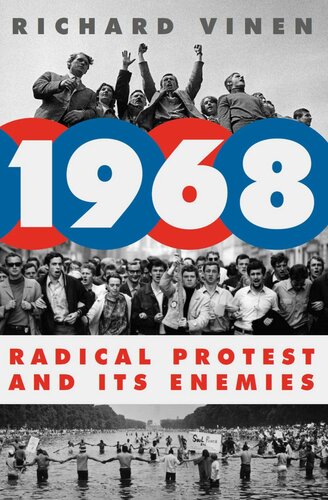
1968
Radical Protest and Its Enemies
کتاب های مرتبط
- اطلاعات
- نقد و بررسی
- دیدگاه کاربران
نقد و بررسی

May 15, 2018
A compelling history of 1968 and beyond.This year marks the 50th anniversary of that epochal year, and numerous books, magazine features, newspaper tributes, and conferences and symposia continue to commemorate it. One of the better of these treatments is this one by Wolfson Prize winner Vinen (History/King's Coll. London; National Service: Conscription in Britain 1945-1963, 2014, etc.), a fine book on the various strands of protest and opposition that emerged in what he calls the "Long 1968," which effectively involves the longer-term trends of the 1960s and 1970s, with 1968 as both the apex and the fulcrum. The author does not focus on just one location; this is not about 1968 in the United States or France. Nor does he purport to tell the story of a "global 1968," one of the more popular recent approaches of historians and scholars. Instead, Vinen splits the difference, looking comparatively at the Long 1968 in the U.S., the U.K., France, and West Germany, with brief detours elsewhere, emphasizing transnational trends as well as the particularities of how protest movements emerged and the barriers they faced. The author devotes chapters to specific overarching themes: how 1968 manifested in universities and challenged prevailing sexual and family norms, the role of and impact on workers and labor movements, and how violence by actors on all sides of the myriad conflicts affected society. Vinen is a sharp scholar, and his geographical and thematic approaches are useful for those with some sense of the larger stories of 1968. His work is not, however, suitable as an introduction to the many events and trends of the year. This is less a criticism than a simple reminder that scholars build on other work and that not all works of history, however good, provide suitable introductions to complex phenomena.Though the book is not for readers unfamiliar with the historical terrain, Vinen provides a well-written, deeply considered work on a year that seems increasingly immediate in both its impact and implications.
COPYRIGHT(2018) Kirkus Reviews, ALL RIGHTS RESERVED.

May 21, 2018
In his introduction to this wide-ranging and dense volume, Vinen (National Service), a history professor at King’s College London, explains that “this book is about ‘68’, by which I mean the radical movements and rebellion of the late 1960s and early ’70s.... 68 is both ubiquitous and remote.” It’s an ambitious task, to tackle the many elements that make up the “long 68” and its impact upon the world, but Vinen gives it his best shot. Acknowledging the global scope of his topic, the combination of revolutions, movements, wars, and social upheaval that defined the era, he chooses to focus on the “democracies of the industrialized West” and the “affluent countries in which radical protest came up against elected governments,” in particular France, Britain, West Germany, and the United States. Naturally, he examines the part played by universities—hotbeds of political and radical thinking, and battlegrounds for social change and new modes of behavior. He also surveys the fights for civil rights, gay rights, gender equality, and sexual liberation, all of which were manifest during this period. Vinen covers a lot of ground in a thorough, somewhat dry manner, making for a slow-going read, albeit one that rewards the dutiful reader with a fascinating overview of a pivotal era. Agent: James Pullen, Wylie Agency (U.K.).

June 15, 2018
Vinen's (history, King's Coll. London; National Service) new book takes a long view of 1968 and of the era, offering a nuanced understanding of the conflicts between protesters and the establishment through the lens of universities, factory floors, and domestic life. The work focuses on Western democracies, a limitation acknowledged in the prolog, even though the legacy of colonialism remains necessarily at the forefront of many narratives. Vinen's history challenges some common assumptions about the protests and protesters of the period. Questioning cross-border generalizations about radical movements, he reveals how the year unfolded in unique and culturally specific ways in continental Europe, Great Britain, and the United States. Vinen's "long 1968" arguably extends into the 1990s, when Bill Clinton and others who came of age protesting on college campuses went on to lead the institutions they once denounced. VERDICT With a skeptic's keen eye, Vinen provides a greater understanding of the time that all readers can appreciate.--Bart Everts, Rutgers Univ.-Camden Lib., NJ
Copyright 2018 Library Journal, LLC Used with permission.

























دیدگاه کاربران